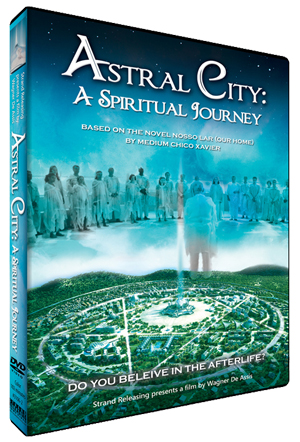Home Video Hovel- Astral City: A Spiritual Journey
 On the face of it, there’s nothing terribly wrong with Astral City: A Spiritual Journey, and yet as soon as it begins, you sort of sigh and say, “oh, it’s one of those movies.” And we all know what kind of movies those are, even if our experience with them is necessarily limited. Those movies are about some mystical-spiritual concept wrought with lots of glow-y lighting, white robes, multiple sources of sunlight, and while they don’t always involve this narrative, you’re not terribly surprised to find out it’s about a man of means who loved his materialist lifestyle, and maybe spent too much time working and not enough with his family, learning about life’s greater truths through the process of reincarnation. So while that latter part is a story worth telling (and has been told before, with “reincarnation” standing in for a thousand other things). The problem with Astral City isn’t its hippie-dippy-trippy intent, but rather that it doesn’t carry that intent towards its logical conclusion.
On the face of it, there’s nothing terribly wrong with Astral City: A Spiritual Journey, and yet as soon as it begins, you sort of sigh and say, “oh, it’s one of those movies.” And we all know what kind of movies those are, even if our experience with them is necessarily limited. Those movies are about some mystical-spiritual concept wrought with lots of glow-y lighting, white robes, multiple sources of sunlight, and while they don’t always involve this narrative, you’re not terribly surprised to find out it’s about a man of means who loved his materialist lifestyle, and maybe spent too much time working and not enough with his family, learning about life’s greater truths through the process of reincarnation. So while that latter part is a story worth telling (and has been told before, with “reincarnation” standing in for a thousand other things). The problem with Astral City isn’t its hippie-dippy-trippy intent, but rather that it doesn’t carry that intent towards its logical conclusion.
We meet Andre Luiz (Renato Prieto) in purgatory, though honestly, if this is purgatory, I’d hate to imagine writer/director Wagner de Assis’ vision of Hell. We come to understand that even without viable sustenance, people just continue to exist here in a state of uncertainty. How do we know that? Because Andre says, in voiceover, “Throughout this dimension of devastation, I would just survive.” No doubt that line is lifted from the novel upon which the film is based, but Assis’ inclusion of it is at once an indulgence in a story he clearly believes in fervantly, and a rather glaring bit of mismanagement in the adaptation process. This purgatory, on the whole, is a rather ugly experience, not just in the hoards of people moaning in mud, but also the wretched low-tech way in which they captured it. And that, in turn, would be an interesting creative decision if the forthcoming Astral City wasn’t conveyed so much the same way.
After awhile, Andre is pulled from purgatory by some, eh, “friendly spirits,” who transport him to a field before walking him into The Astral City. And here’s where things get really awful. This very quickly becomes a spiritual film about the afterlife that is starkly, stunningly literal. So it’s not, after all, some hippie-dippy-trippy whirlwind tour through the death and life and rebirth (kind of like a low-rent Enter the Void), but rather a story about the bureaucracy of the spiritual realm (kind of like a low-rent The Adjustment Bureau). I don’t know why people keep using this crutch, be it the jury of the undead at the end of The Devil and Daniel Webster or A Matter of Life and Death, or here, when you use computers and submit applications and wait for approval and travel by train and…is our concept of life after death really so limited? Hell, there’s a Ministry of Regeneration! This makes Hereafter’s smoke-filled abyss look imaginative.
We get a rather splendid transfer on DVD from Strand Releasing, negotiating the darker elements of purgatory nicely without running into compression issues, and acutely communicating the blinding light of Astral City (which I wish I could say in some booming announcer voice) without, y’know…blinding anyone. Astral City is also a very blue place, and even without the benefit of an HD transfer, the blue really pops. The image on the whole is sharp and detailed. The audio is similarly robust – the score by, of all people, Phillip Glass is as busy and overbearing as one would hope for. The feature, which is a Brazilian production, features English subtitles for the hard-of-translating. On the special features side, you get a theatrical trailer and a making-of featurette that, though it only runs around 24 minutes, is broken up into seven chapters. So if this has been on your to-watch list for some time now, Strand is taking care of you.



























